TICKTIN
Harold Ticktin, 85, writes a weekly column for the Cleveland Jewish News on Yiddish. For instance, he writes about what balabuste means, or balegole. (Female boss and wagon-driver.)
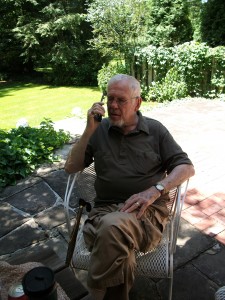
Harold Ticktin, Shaker Heights, 2012
Also, Harold occasionally reflects on early-20th century leftist politics for magazines such as Jewish Currents.
I asked Harold for a couple Yiddish translations. I was in his backyard in Shaker Heights. I wanted to know Yiddish permutations on “How’s it going in?” — everything from “How are you?” to “What’s happnin’, man?” Ticktin gave me some options, none perfect, and concluded, “Translation is treason.”
He continued, “Listen, there was this pharmacist who did a big business in trusses – you know what a truss is?”
“Yes.”
“The pharmacist’s slogan was Ayer kile iz undzer gedile — your hernia is our pleasure. I told the pharmacist that was a horrible translation. He told me to come up with a better one. I said, ‘Your rupture is our rapture.’ Wouldn’t that make a great bumper sticker for an abdominal surgeon?”
“Did you make that up — your rupture is our rapture?” I said.
“That’s a true story. It’s an absolutely true story.”
Ticktin is a retired workers’ comp lawyer. He can speak decent Italian, French and Spanish, as well as Yiddish. One of his favorites translations is All Screwed Up, he said, for the Lina Wertmuller film Tutto a posto e niente in ordine, which literally means “everything ready, nothing works.” “You don’t translate, you render,” Ticktin said.
Ticktin continued, “James Thurber ran into a woman in Germany who said, ‘I love your work in German.’ Thurber said, ‘Yes, it’s true, my work loses something in the original.’”
Ticktin lives three miles from his old stomping grounds — the Kinsman neighborhood. Harold grew up on E. 154th Street, Cleveland, hard by the Shaker Heights-Cleveland line. He said Shaker had been “hakodesh hakadashim [the Holy of Holies] — the other.” Shaker had been nearly unapproachable, like the inner sanctum at the Temple in Jerusalem. “I didn’t know anybody in Shaker. Maybe one person.”
Kinsman Road was Ticktin’s main artery. He said, “I walked [down Kinsman] from 154th to E. 140th to observe the class struggle. My father was a Yankee. He came over here when he was two. He liked baseball. What did he know about politics? He knew this: Roosevelt was great and Hitler was bad.”
At E. 146 Street, Harold met Peter “The Brain” Ostrovsky. “I was converted to communism by Ostrovsky on the train to the Philly Navy Yard in 1946. I was converted just west of Pittsburgh.”
The upshot: “I saw the God who was to fail, though I still have a warm spot for Marx, for his Lincoln correspondence,” Harold said. “I’m a member of the extreme center now.”
I wanted Ticktin to give me a tour of Kinsman — the proste, working-class Kinsman of his youth. “How about it?” I said. “Now?” Ticktin agreed. We got in my Lolly the Trolley — my Mercury Sable.
***
Stop 1. Woodhill Park at E.116th. Ticktin: “I remember when I was 10 years old [1937] at Woodhill. It was a tremendous swimming pool. Everybody got out of the water. Why? Because Frieda Katz, a geferlikher (dyed-in-the-wool) communist took a swim with a black kid. The place cleared out. This was Frieda Katz from Katz’s Deli at E. 147th and Kinsman.”
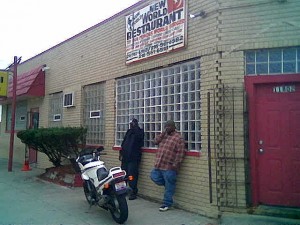
Formerly Seiger's
2. Seiger’s deli at 118th. “I knew Hymie Seiger best. He went off to yeshiva in junior high. He just left. I didn’t even know what a yeshiva was.”
3. E. 121. “This was where I attended my one Seder as a child. On that street. Very important.” Ticktin eventually became president of his shul.
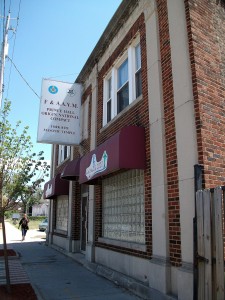
Council Educational Alliance building, now a Masonic hall
4. 13512 Kinsman, the Council Education Alliance. “The apex and GHQ [general headquarters] of my youth. The Communist Club met there.” It was a settlement house.
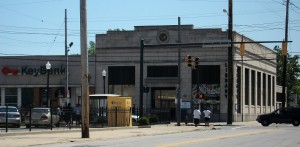
Cleveland Public Library - Mt. Pleasant branch
“In the 1936 election, the Communist Club painted ‘Vote Communist’ in blue on the library at E. 140th. The library had been a bank before. Some members of the club got mad because the graffiti was blue. They said, ‘We need to paint it red.’ Ostrovsky went back to re-paint it and got caught. He was defended by Yetta Land, who handled all the communists. I don’t think Ostrovsky was punished too severely; he was a juvenile.”
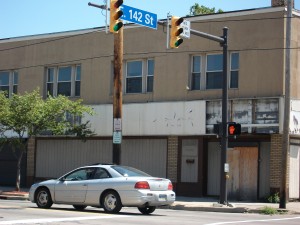
Formerly Spumoni's (middle store)
5. E 142 and Kinsman. “We called this place Spumoni’s. The real name was Giaimo’s — an ice cream place. The communists met across the street above the Woolworth’s, which is long gone.
“On Saturday nights all the single Jewish guys would hang out here at Spumoni’s and greet each other Marty-style, like, ‘Whadaya want to do, Marty?’ This went on up through the 1940s and 1950s.”
“What’s Marty-style.”
“Like Marty, the movie with Ernest Borgnine. You don’t remember it?”
“No.”
“Single Jews guys — and married Italians — hung out, to go out on the town. I always envisioned a cowering Italian wife in the kitchen back home saying, ‘Tony, when you gonna be home?’”
6. E. 154th / the Shaker Heights line. “Hakodesh — the other,” Ticktin said. “I was in New York once and stopped in at YIVO [Jewish Research Institute] for a list of places European Jews had vacationed before the war. I needed this for a speech in Yiddish. They asked me, ‘You mean intellectuals? Peasants? We’ll get back to you.’ They didn’t get back to me. A couple weeks later, I’m at a gathering of Jews and Poles in Cleveland, an American Jewish Committee meeting, and I meet the speaker, a prominent Polish Jew, Lucjan Dobroszycki, the editor of the Chronicle of the Lodz Ghetto. I ask him about vacation spots before the war. He looks at me and says, ‘This is the second time in two weeks somebody has asked me this question.’ End of the line, Lucjan Dobroszycki — don’t ask me how to spell that.”
7. I drive Harold Ticktin into Shaker Heights. Another end of the line.
—
The photos, above, are from 2012, except the former Seiger’s deli pic, which is from 2010. Seiger’s — later New World Restaurant — is now boarded up.
—
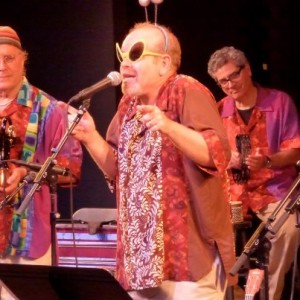 Yiddishe Cup plays a concert in Metro Detroit.
Yiddishe Cup plays a concert in Metro Detroit.
2 p.m. Sun. SEPT 9
Congregation Beth Shalom
Oak Park, Michigan




8 comments
One of your best blogs yet! Keep up the good work.
Harold Ticktin is a raconteur in the finest sense; Knowledgeable, witty, and an amiable guy who can more than hold his own in an argument.
Thanks, Bert, for sharing Harold Ticktin insights and stories with your readers. Wish there was someone who would do it on a larger scale. It would be a great read.
misc. yiddish non sequitur: I keep this in a file of random important stuff. I had a Yiddish-fluent friend translate it for me some years ago for fear that there would come a day when I, or my daughter, couldn’t remember it. It was my Aunt Ruthie’s favorite curse: Zol dine kup voxen viat sybil fin de ayat! (Hope it means what I think it means!)
To Ellen:
Standard version:
Er zol vaksen vi a tisbeleh mit dem kop in drerd.
You should grow like an onion with your head in the ground.
Meaning — I think: I wish you dead.
well, yeah, but it’s so much more poetic in yiddish. and I guess as a kid I always thought it meant more like you don’t have a clue what’s going on…. in the grown up light of day, it’s rather harsh, huh? Oh well. I’ve got a few more from my Mom which I won’t repeat here. :-)
My grandparents, Paul and Sarah Chaplick, had a little grocery store next to Sollie’s Deli (was that after Katz’s) at E. 147th and Kinsman.
Thank you,this helps me in my life long pursuit of trying to figure out my Dad.
Leave a Comment